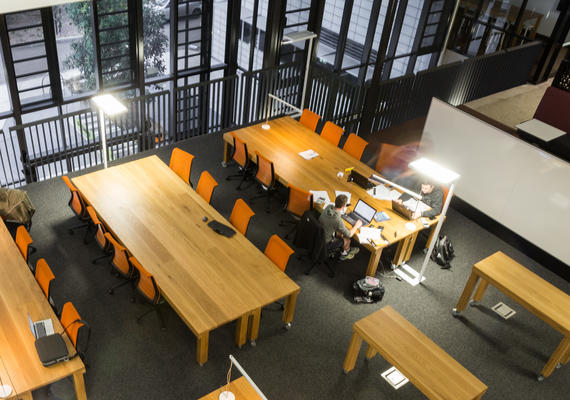Study a masters or PhD with us
Employers seek out Deakin engineering graduates for their forward-thinking, innovative approach and entrepreneurial qualities.
With us, you can develop technical skills and a positive approach to problem solving. Plus, you'll gain the experience of working on a supervised research or industry project that'll give you the advanced project management skills you need to tackle complex, industry-focused problems.
Our postgraduate research supervisors are available across a range of disciplines, including:
- additive manufacturing
- civil engineering
- design technology
- electrical and electronics engineering
- engineering management
- environmental engineering
- mechanical engineering
- mechatronics engineering
- renewable energy engineering.

Study a PhD at Deakin
PhD student Xin Li extended his interest in sustainable building materials when he joined supervisor Dr Mahmud Ashraf at Deakin. In partnership with industry, Xin’s PhD looks at innovative and environmentally sustainable cross-laminated timber.
Deakin Digital Design and Engineering Centre
Deakin Digital Design and Engineering Centre (3DEC) was established to respond to the technology-centred industrial revolution by combining design and engineering innovation, with cutting-edge digital fabrication and sensor technology expertise. Our collaboration is based on integrating multi-disciplinary ingenuity, people-centred solutions and improving social, economic and environmental outcomes through digital technology innovations.
Energy Research Theme
The Energy Research Theme represents a wide range of research activities in electrical, power, renewable and thermal energy research. Our team is involved in improving the ways we generate, transmit, use, mitigate and store energy with an aim to solve the key challenges that governments, industry and society faces.
The School of Engineering has several world-class research facilities supporting our research in this area including our high voltage, renewable energy and power engineering laboratories. We also have state-of-the-art modelling and simulation capability for thermal energy systems and use of our Microgrid research platform.
Centre for Smart Power and Energy Research (CSPER)
The centre’s research focus is on three main areas including future power grids, renewable energy and energy storage, and cyber-physical energy systems. Sustainable generation of energy, integration of renewable energy sources and development of new energy management systems are becoming essential to the future of power, and our research aims to deliver solutions for our communities.
Flow, Aerosols and Thermal Energy (FATE) Research Group
The FATE Group brings together an energetic and driven team of researchers with expertise in a broad range of science and engineering fields. Our research focus is in three areas including thermal energy, environmental emissions, and biomedical and bio-fluids.
Infrastructure and Environment Research Theme
The Infrastructure and Environment Research Theme consists of multidisciplinary research groups that provides sustainable solutions in the areas of built and natural environment. We aim to develop technologies to address challenges in of construction, water resource, climate change and environment.
Environmental Chemistry and Climate Resilience Engineering Research Group
Our research focuses on engineering solutions for the real-world problems that climate change can cause, including impacts of extreme weather events and resilient water supply.
Engineered Timber Structures Research Group
Our research in engineered mass timber and bio-based composite materials covers manufacturing, supply chain, material characterisation and structural design.
Safe Future Mobility Research Lab
Our research specialises in modelling, analysing and evaluating the safety and mobility aspects of all types of road transport users, both for the current and future transport systems of urban and rural areas.
Sustainable Composite Materials and Structures Research Group
Our research focuses on composite materials for construction and structures, working with industry to develop novel uses of engineered materials such as recycled materials.
Geotechnics and Infrastructure Research Group
Our research focuses on solving challenging geotechnical problems and how to improve surface and underground infrastructure. We do this by developing and implementing cutting-edge experimental, data-driven and computational tools, as well as field investigation techniques.
Water-Energy Nexus Research Group
Our research focuses on the co-dependency of water and energy and how systems can be designed and engineered to be sustainable and efficient.
Water Resources and Asset Management Research Group
Our group's research focus is on how water is being captured and used, as well as the overarching management of engineered solutions and technologies.
Smart Technologies Theme
The Smart Technologies Research Theme is a centre of excellence consisting of multidisciplinary research programs that provide research and development to create new knowledge and innovative technologies for solving fundamental and applied research problems, and creating and supporting jobs of the future. The Centre for Smart Technologies includes the following research programs:
Advanced Robotics Technologies (ART)
ART research focuses on electronics, mechanical, software and control for robotic platforms. This includes robots and their uses, and sensors and control systems for robots.
Biomedical systems design (BSD)
BSD research focuses on rehabilitation and assistive device design for biomedical applications. This utilises strengths in the bio-mechanic-based problems, robust estimation and human motion capture, signal filtering and motion analytics.
Control systems (COS)
COS research focuses on developing innovative, integrable software and hardware solutions with novel theories and technologies for the next generation of interconnected and complex systems.
Instrumentation and measurement systems design (IMD)
IMD research focuses on designing and deploying measurement technologies for physical parameters. We design and build nano scale to large scale measurement systems for environmental, biological, and industrial applications.
Sensors, devices and IoT technologies (SENDO)
SENDO research focuses on the design and development of smart devices, circuits, instruments and systems incorporating sensing, actuation, wireless transmission, networking and IoT, data acquisition/storage, control, AI analysis, energy harvesting, and power management.
Contact us
Associate Head of School, Research Assoc. Prof. Ben Horan
Phone +61 3 5227 2907 or email Assoc. Prof. Horan
HDR Coordinator Assoc. Prof. Mahmud Ashraf
Phone +61 3 5227 8450 or email Assoc. Prof. Mahmud Ashraf
Dr Jorg Schluter
Phone +61 3 5227 3382 or email Dr Jorg Schluter
